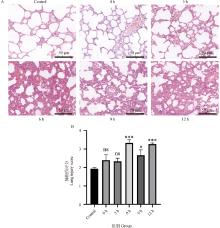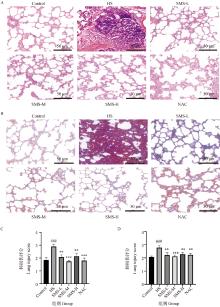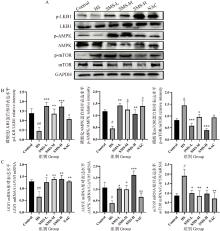





Acta Veterinaria et Zootechnica Sinica ›› 2025, Vol. 56 ›› Issue (10): 5277-5288.doi: 10.11843/j.issn.0366-6964.2025.10.046
• Clinical Veterinary Medicine • Previous Articles Next Articles
XIAO Wei1( ), DONG Jiaqi1, ZHANG Xiaosong2, ZHOU Ke1, WEI Yanming1,*(
), DONG Jiaqi1, ZHANG Xiaosong2, ZHOU Ke1, WEI Yanming1,*( )
)
Received:2024-12-30
Online:2025-10-23
Published:2025-11-01
Contact:
WEI Yanming
E-mail:732261905@qq.com;weiym@gsau.edu.cn
CLC Number:
XIAO Wei, DONG Jiaqi, ZHANG Xiaosong, ZHOU Ke, WEI Yanming. The Effects of Sheng Mai San on the AMPK-mTOR Pathway and Autophagy in the Lungs of Rats under Heat Stress[J]. Acta Veterinaria et Zootechnica Sinica, 2025, 56(10): 5277-5288.
Table 1
Real-time fluorescent quantitative PCR primers"
| 引物名称 Primer name | 上游引物(5′→3′) Forward sequence | 下游引物(5′→3′) Reverse sequence |
| 热休克蛋白70 HSP70 | TCGAACAGTTCAAGATCAAACG | CCGGAACTTCTTGTAGTAGTCA |
| 白细胞介素1β IL-1β | AACTGTGAAATAGCAGCTTTCG | CTGTGAGATTTGAAGCTGGATG |
| 白细胞介素6 IL-6 | CACTGCCTTCCCTACTTC | CATCATCGCTGTTCATAC |
| 白细胞介素10 IL-10 | GTTGCCTGCTCTTACTGG | ATGCTCCTTGATTTCTGG |
| 肿瘤坏死因子α TNF-α | CATGGATCTCAAAGACAACCAA | CTCCTGGTATGAAATGGCAAAT |
| 肝激酶B1 LKB1 | GGAGGACGAGGACTTGTTT | CTCTGTCCATTCTGACCCAC |
| 腺苷酸活化蛋白激酶 AMPK | AGGGTTGAAGAGGTGGAAGC | GGCAATAGAACGGTTGAGATACT |
| 哺乳动物雷帕霉素靶蛋白 mTOR | GAGATACGCCGTCATTCC | GCATCAGAGTCAGGTGGTC |
| 自噬效应蛋白 Beclin1 | CGCTGTTTGGAGATGTT | TGAAATTATTGATCGTGCC |
| 泛素结合蛋白 P62 | AGGCTTTCAGGCGCACTACC | TGGCCATTGTCAGTTCCTCATC |
| 微管相关蛋白轻链3 ILC3 | ATAGAGCGATACAAGGGTGAGAAG | AGAAGGCTTGGTTAGCATTGAG |
| 甘油醛-3-磷酸脱氢酶 GAPDH | ACGGGAAACCCATCACCATC | CTCGTGGTTCACACCCATCA |

Fig. 1
Effect of different rewarming times under HS on the histopathological changes in the lung tissue of SD rats A. Representative lung tissue sections were observed for histopathological changes using hematoxylin and eosin (HE) staining (400×); B. Lung injury assessment. n=3, compared with the control group, *. P<0.05, **.P<0.01, ***. P<0.001"


Fig. 3
Effect of SMS on HS-induced lung injury A. Effect of SMS on pathological changes in lung injury caused by heat stress; B. Effect of SMS on fibrosis in heat stress-induced lung injury; C. Lung injury assessment (n=3); D. Lung wet-to-dry weight ratio (n=6). Compared with the control group, #. P<0.05, ##. P<0.01, ###. P<0.001, ns. P>0.05; compared with the HS group, *. P<0.05, **. P<0.01, ***. P<0.001, ns. P>0.05, the same as below"


Fig. 6
SMS alleviates HS-induced lung injury by activating the AMPK-mTOR pathway A.Western blot analysis of LKB1, AMPK, mTOR, and their phosphorylated forms in rat lung tissue; B. Bar graphs of protein expression ratios: p-LKB1/LKB1, p-AMPK/AMPK, and p-mTOR/mTOR; C. Bar graphs of LKB1, AMPK, and mTORmRNA expression in rat lung tissue. n=6"

| 1 | WU T , SHENG Y , TIAN Y , et al. Vitexin regulates heat shock protein expression by modulating ROS levels thereby protecting against heat-stress-induced apoptosis[J]. Molecules, 2023, 28 (22): 7639. |
| 2 | OLUWAGBENGA E M , F RALEY G S . Heat stress and poultry production: a comprehensive review[J]. Poult Sci, 2023, 102 (12): 103141. |
| 3 | YANG Y , LI C , LIU N , et al. Ursolic acid alleviates heat stress-induced lung injury by regulating endoplasmic reticulum stress signaling in mice[J]. J Nutr Biochem, 2021, 89, 108557. |
| 4 | ZHOU G , CHEN Z , LI J , et al. Role of the receptor for advanced glycation end products in heat stress-induced endothelial hyperpermeability in acute lung injury[J]. Front Physiol, 2020, 11, 1087. |
| 5 | LIU S , YAO S , YANG H , et al. Autophagy: Regulator of cell death[J]. Cell Death Dis, 2023, 14 (10): 648. |
| 6 | HARDIE D G . AMPK: a key regulator of energy balance in the single cell and the whole organism[J]. Int J Obes, 2008, 32 (Suppl 4): S7- 12. |
| 7 | 王艺, 侯露露, 方菲, 等. 氟通过自噬和铁死亡途径诱发肉鸡小肠氧化损伤[J]. 畜牧兽医学报, 2025, 56 (1): 442- 454. |
| WANG Y , HOU L L , FANG F , et al. Fluoride induces oxidative damage in the small intestine of broiler chickens through autophagy and iron death pathways[J]. Acta Veterinaria et Zootechnica Sinica, 2025, 56 (1): 442- 454. | |
| 8 | ZHANG X , ZHANG H , GAO Y , et al. Forsythoside A regulates autophagy and apoptosis through the AMPK/mTOR/ULK1 pathway and alleviates inflammatory damage in MAC-T cells[J]. Int Immunopharmacol, 2023, 118, 110053. |
| 9 | ALERS S , LÖFFLER A S , WESSELBORG S , et al. Role of AMPK-mTOR-Ulk1/2 in the regulation of autophagy: cross talk, shortcuts, and feedbacks[J]. Mol Cell Biol, 2012, 32 (1): 2- 11. |
| 10 | YAN L S , ZHANG S F , LUO G , et al. Schisandrin B mitigates hepatic steatosis and promotes fatty acid oxidation by inducing autophagy through AMPK/mTOR signaling pathway[J]. Metabolism, 2022, 131, 155200. |
| 11 | RACANELLI A C , KIKKERS S A , CHOI A M K , et al. Autophagy and inflammation in chronic respiratory disease[J]. Autophagy, 2018, 14 (2): 221- 232. |
| 12 | SAEED M , ABBAS G , ALAGAWANY M , et al. Heat stress management in poultry farms: A comprehensive overview[J]. J Therm Biol, 2019, 84, 414- 425. |
| 13 | ZHU X Y , CHENG G L , LIU F H , et al. Taguchi approach for anti-heat stress prescription compatibility in mice spleen lymphocytesin vitro[J]. Arch Pharmacal Res, 2011, 34 (7): 1125- 1133. |
| 14 | ZHANG X , JIA Y , YUAN Z , et al. Sheng Mai San ameliorated heat stress-induced liver injury via regulating energy metabolism and AMPK/Drp1-dependent autophagy process[J]. Phytomedicine, 2022, 97, 153920. |
| 15 | YANG Y , TIAN Y , HU S , et al. Extract of Sheng-Mai-San ameliorates myocardial ischemia-induced heart failure by modulating Ca2+-calcineurin-mediated Drp1 signaling pathways[J]. Int J Mol Sci, 2017, 18 (9): 1825. |
| 16 | 张晓松. SMS对HS致大鼠肝脏损伤保护作用及其机制研究[D]. 兰州: 甘肃农业大学, 2024. |
| ZHANG X S. Protective effect and mechanism of SMS on HS induced liver injury in rats[D]. Lanzhou: Gansu Agricultural University, 2024. (in Chinese) | |
| 17 | 中华中医学会. 中药标准汤剂制备技术规范: T/CACM 1572-2024[S]. 北京: 中华中医学会, 2024. |
| China Association of Chinese Medicine. Technical specification for preparation of traditional Chinese medicine standard decoction: T/CACM 1572-2024[S]. Beijing: China Association of Chinese Medicine, 2024. (in Chinese) | |
| 18 | 刘国星, 黄元铭, 程淼, 等. 甲型H1N1流感病毒感染对小鼠肺损伤及肠道菌群的影响[J]. 疾病监测, 2021, 36 (7): 689- 695. |
| LIU G X , HUANG Y M , CHENG M , et al. The impact of H1N1 influenza virus infection on lung injury and gut microbiota in mice[J]. Disease Surveillance, 2021, 36 (7): 689- 695. | |
| 19 | 曹占鸿, 潘建衡, 李娜, 等. 生脉散现代药理作用及作用机制的研究进展[J]. 中国实验方剂学杂志, 2019, 25 (22): 212- 218. |
| CAO Z H , PAN J H , LI N , et al. Research progress on modern pharmacological effects and mechanisms of Shengmaisan[J]. Chinese Journal of Experimental Formulae, 2019, 25 (22): 212- 218. | |
| 20 | HOU Y , HE Z , HAN Y , et al. Mechanism of new optimized Sheng-Mai-San Formula to regulate cardiomyocyte apoptosis through NMDAR pathway[J]. Heliyon, 2023, 9 (6): e16631. |
| 21 | WU Y , WANG M , XU J , et al. Signature network-based survey of the effects of a traditional Chinese medicine on heart failure[J]. J Ethnopharmacol, 2022, 283, 114750. |
| 22 | KOCH F , THOM U , ALBRECHT E , et al. Heat stress directly impairs gut integrity and recruits distinct immune cell populations into the bovine intestine[J]. Proc Natl Acad Sci U S A, 2019, 116 (21): 10333- 10338. |
| 23 | BHARATI J , DANGI S S , CHOUHAN V S , et al. Expression dynamics of HSP70 during chronic heat stress in Tharparkar cattle[J]. Int J Biometeorol, 2017, 61 (6): 1017- 1027. |
| 24 | ZHAO Y , ZHUANG Y , SHI Y , et al. Effects of N-acetyl-l-cysteine on heat stress-induced oxidative stress and inflammation in the hypothalamus of hens[J]. J Therm Biol, 2021, 98, 102927. |
| 25 | MIN L , ZHENG N , ZHAO S , et al. Long-term heat stress induces the inflammatory response in dairy cows revealed by plasma proteome analysis[J]. Biochem Biophys Res Commun, 2016, 471 (2): 296- 302. |
| 26 | YIN Y , GUO J , LIU Z , et al. Selenium deficiency aggravates heat stress pneumonia in chickens by disrupting the M1/M2 balance[J]. Biol Trace Elem Res, 2022, 200 (7): 3315- 3325. |
| 27 | MOHYUDDIN S G , QAMAR A , HU C Y , et al. Terpinen4-ol inhibits heat stress induced inflammation in colonic tissue by activating occludin, claudin-2 and TLR4/NF-κB signaling pathway[J]. Int Immunopharmacol, 2021, 99, 107727. |
| 28 | BELHADJ S I , NAJAR T , GHRAM A , et al. Heat stress effects on livestock: molecular, cellular and metabolic aspects, a review[J]. J Anim Physiol Anim Nutr, 2016, 100 (3): 401- 412. |
| 29 | 常青青. 壳寡糖对急性HS芦花鸡肌肉品质、抗氧化能力和能量代谢的影响[D]. 湛江: 广东海洋大学, 2022. |
| CHANG Q Q. The effect of chitosan oligosaccharides on muscle quality, antioxidant capacity, and energy metabolism in acute HS Luhua chickens[D]. Zhanjiang: Guangdong Ocean University, 2022. (in Chinese) | |
| 30 | MIROUSE V , BILLAUD M . The LKB1/AMPK polarity pathway[J]. FEBS Lett, 2011, 585 (7): 981- 985. |
| 31 | XIA Z , HUANG L , YIN P , et al. L-Arginine alleviates heat stress-induced intestinal epithelial barrier damage by promoting expression of tight junction proteins via the AMPK pathway[J]. Mol Biol Rep, 2019, 46 (6): 6435- 6451. |
| 32 | KIM Y C , GUAN K L . mTOR: a pharmacologic target for autophagy regulation[J]. J Clin Invest, 2015, 125 (1): 25- 32. |
| 33 | ZHOU J , LI C , LU M , et al. Pharmacological induction of autophagy reduces inflammation in macrophages by degrading immunoproteasome subunits[J]. PLoS Biol, 2024, 22 (3): e3002537. |
| 34 | WANG Z , WU Y , PEI C , et al. Astragaloside Ⅳ pre-treatment attenuates PM2.5-induced lung injury in rats: Impact on autophagy, apoptosis and inflammation[J]. Phytomedicine, 2022, 96, 153912. |
| 35 | YANG P , LI Z , TYE K D , et al. Effects of an orally supplemented probiotic on the autophagy protein LC3 and Beclin1 in placentas undergoing spontaneous delivery during normal pregnancy[J]. BMC Pregnancy Childbirth, 2020, 20 (1): 216. |
| 36 | TANIDA I , UENO T , KOMINAMI E . LC3 and Autophagy[J]. Methods Mol Biol, 2008, 445, 77- 88. |
| 37 | LAMARK T , SVENNING S , JOHANSEN T . Regulation of selective autophagy: the p62/SQSTM1 paradigm[J]. Essays Biochem, 2017, 61 (6): 609- 624. |
| [1] | YI Huanming, BAO Guosheng, WAN Hui, OU Jingyu, HE Xiaolong, REN Chunhuan, CHEN Jiahong, ZHANG Zijun, WANG Qiangjun. Research Progress of Heat Stress Affect Digestive Tract Barrier Function of Ruminants by Interfering with Biological Clock [J]. Acta Veterinaria et Zootechnica Sinica, 2025, 56(9): 4204-4214. |
| [2] | DONG Jianing, HU Yingfan, DOU Yufei, LI Jun, SHI Lei, REN Youshe. Effects of Excessive Selenium on Autophagy of Leydig Cells in Sheep through PI3K/AKT/FoxO1 Pathway [J]. Acta Veterinaria et Zootechnica Sinica, 2025, 56(8): 3837-3848. |
| [3] | ZHAO Shunran, FU Guixin, PANG Zhaoqi, XIA Wei, LI Junjie, TAO Chenyu. Research Progress on the Mechanism of Porcine Granulosa Cells in Follicular Atresia [J]. Acta Veterinaria et Zootechnica Sinica, 2025, 56(6): 2537-2545. |
| [4] | LUO Jia, PU Qiang, CHAI Jie, CHEN Li, WANG Jinyong. Biological Effects and Genetic Mechanisms of Intrauterine Heat Stress in Swine [J]. Acta Veterinaria et Zootechnica Sinica, 2025, 56(5): 2004-2014. |
| [5] | WANG Ying, ZHANG Jiaojiao, WANG Xianzhong, QUAN Fusheng. Advances in Autophagy of Ovarian Granulosa Cells [J]. Acta Veterinaria et Zootechnica Sinica, 2025, 56(4): 1508-1517. |
| [6] | LI Xiaowei, TIAN Wei, LIU Yuan, LI Huixia. Study on the Difference of m6A Methylation Modification in Ovarian Granulosa Cells of Hu Sheep under Heat Stress [J]. Acta Veterinaria et Zootechnica Sinica, 2025, 56(4): 1712-1721. |
| [7] | WANG Xinxin, LIU Xiaoying, WANG Yi, WANG Fang, ZHAO Han, DU Zhiqiang, YANG Caixia. Acute Heat Stress Affects the Functions of Porcine Sertoli Cells via Decreasing Taurine Level [J]. Acta Veterinaria et Zootechnica Sinica, 2025, 56(4): 1779-1790. |
| [8] | HOU Wanchen, XU Tong. Cannabidiol Antagonizes BPA-induced Apoptosis and Autophagy in Porcine Intestinal Epithelial Cells through the BRD4/AMPK/mTOR Signaling Pathway [J]. Acta Veterinaria et Zootechnica Sinica, 2025, 56(4): 1919-1933. |
| [9] | LIANG Hui, ZHAO Jing, WANG Yanya, LONG Runze, LIU Xuyang, WU Yingjie, LIU Ning, QIN Yinghe. Effects of Dietary Chlorogenic Acid on Reproductive Performance of Female Rabbits and Growth of Suckling Rabbits under Heat Stress Conditions [J]. Acta Veterinaria et Zootechnica Sinica, 2025, 56(2): 755-764. |
| [10] | HU Xiuzhen, ZHOU Mengting, ZHANG Fan, LIU Zihao, TANG Xiangfang, XIONG Benhai. Effects of Inulin on Production, Immunity, Antioxidant Performance and Hormone Levels in Heat-stressed Dairy Cows [J]. Acta Veterinaria et Zootechnica Sinica, 2025, 56(10): 5018-5029. |
| [11] | WANG Yi, HOU Lulu, FANG Fei, GAO Linying, XIE Shumin, WANG Yu. Fluoride Induced Small Intestine Oxidative Damage in Broilers via Autophagy and Ferroptosis [J]. Acta Veterinaria et Zootechnica Sinica, 2025, 56(1): 442-454. |
| [12] | Xiangchen LI, Linnan WANG, Zhengqing YU, Li ZHANG, Chenchen YANG, Liangli SONG. Quercetin Inhibits Autophagy to Restore LTA-induced Tight Junction Function in Mammary Alveolar Cells-large T Antigen [J]. Acta Veterinaria et Zootechnica Sinica, 2024, 55(9): 3887-3896. |
| [13] | Yi WANG, Juan GAO, Yuemin HU, Yuefei YANG, Bojun FAN, Huiming JU. Effect of Transient Serum Starvation on Metabolism and Autophagy of Porcine Skeletal Muscle Satellite Cells [J]. Acta Veterinaria et Zootechnica Sinica, 2024, 55(8): 3408-3417. |
| [14] | Xinyu CAO, Jiawei CAI, Zhiyuan BAO, Shuyu YAO, Yunpeng LI, Yang CHEN, Xinsheng WU, Bohao ZHAO. The Function Analysis of ATG14 Regulates the Autophagy Process in Rabbit Hair Follicle Dermal Papilla Cells [J]. Acta Veterinaria et Zootechnica Sinica, 2024, 55(8): 3472-3481. |
| [15] | Yongjie WU, Yinghuan XU, Tengfei LIU, Lin MA, Hong CHEN, Yongping XU. Effect of Scrotal Hyperthermia on Structure and Function of Blood-testis Barrier in Goats [J]. Acta Veterinaria et Zootechnica Sinica, 2024, 55(7): 2973-2982. |
| Viewed | ||||||
|
Full text |
|
|||||
|
Abstract |
|
|||||